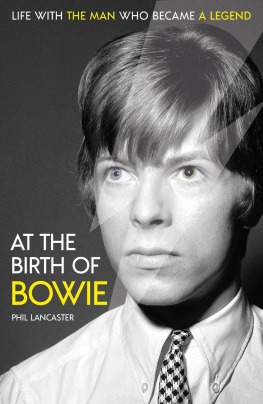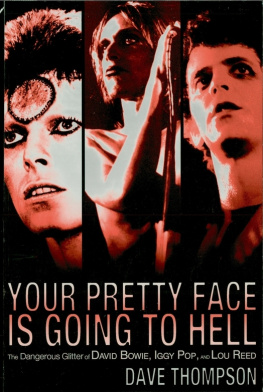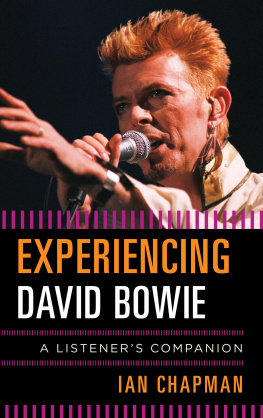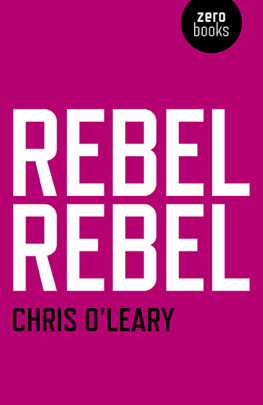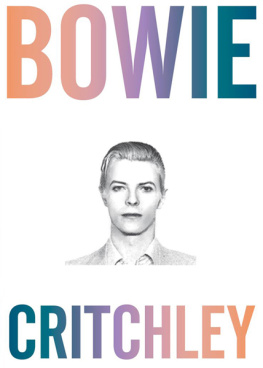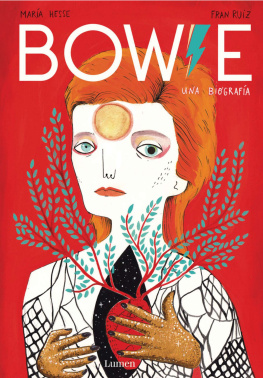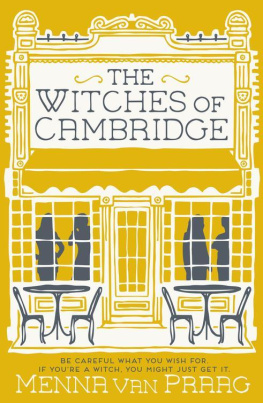BY
DENIS TAYLOR
W hen we met him for the first time, David Robert Jones was a fresh-faced lad, just turned eighteen, from a small terraced home in Plaistow Grove in Bromley, Kent.
In early May 1965, we The Lower Third were holding auditions at a club called La Discotheque in Wardour Street, in the West End of London, where we had a residency. Many musicians and singers turned up that day, but more for a jam session than for an audition, I think.
Among the gathered assortment of musicians were a couple of sax players and another drummer (which we didnt need at that time or even advertise for). In among all these people there were also singers (which we did advertise for) including Steve Marriott, later of Small Faces fame but at that time in a band called Marriotts Moments. He sang with us that afternoon, with others joining in, on an old rock-and-roll standard called Rip It Up.
As the afternoon drifted on and people meandered away, among those who stayed was David, who had also brought along his alto sax and had apparently started out at the audition just playing that. He had probably been hanging around in the background, checking out the competition first, as you do. In fact, I hadnt noticed him at all until he asked to sing (he was still wearing the leather collar and clip he attached to his sax). We let him, of course, but partly because we were getting desperate by this time. Suffice to say that we were all impressed, not only with the range of his voice but also with his distinctive look. Shortly after, and following a bit of thought and discussion, we unanimously decided that This is the guy. In retrospect, I think we chose rather well!
Anyhow, a couple of days later we formally asked him to join us. I thought he was a good singer, but I have to admit I didnt think he would last the distance in the world of professional music. I wasnt sure if he was strong enough. But I thought we would be OK with him.
I was a lot older than he was, so I already knew what was in store for him. It wasnt going to be a bed of roses. All this, of course, before I knew he was already a minor star, or certainly known, due to his very long, blondish hair and appearance in a BBC2 TV interview.
A man with long hair in those days just wasnt the thing. Its difficult to imagine today, but it really was shocking and even upset many people back then. It certainly got him noticed, though.
He was new to songwriting at that time, so would experiment with ways to write songs. I remember strange times when he was at our flat in Pimlico, London (which certainly wasnt a posh area of town in 1965), and he would ask me to come into the bedroom with my guitar. We would sit on the bed and he would say, Just place your fingers anywhere on the fret and hit the strings. So I would, and from that he would attempt to come up with a new song on his twelve-string, just from the random sounds it made. This didnt always work out and more often we would just laugh a lot and create daft songs from the noise (as noise is all I can call it) that we made. This gave us a lot to chuckle about and possibly led to a few ideas for David to develop further. We had some great moments, all the same, but I dont know what the others must have been thinking in the other room, hearing the racket we made.
David and I used to go to Denmark Street almost daily. Next door to La Gioconda our favourite caf was a small demo studio that producer Shel Talmy had allowed David to use at any time. So we were often dragged in there with no idea of what David was going to play on his acoustic after our impromptu noise jams. The ideas seemed to change a bit by the time we got there. He must have been thinking about it during the journey to the studio. It was always interesting and I never knew what he would finally come up with. It was a nice little set-up where David and the rest of us could experiment with and listen back to the results. If the session worked, we might take away some demo discs.
About a month after David joined us, our drummer, Les, decided he was homesick and really missed his girlfriend in Ramsgate. David said it was no problem, he would find us another drummer straight away. He certainly did, and what a drummer! That was Phil Lancaster, who just happens to be the author of this book. What are the chances of that!
When Phil joined us, for some reason I was under the impression that he had previously been in a large Mexicano-type band, or something like that. I havent a clue why I thought that or why that stayed with me!
There is no need for me to tell you any more, as Phil has a far better memory of these events than me.
From here on, he will tell you how it all went for us the highs and the lows, and some of the bits in between. Its a great read.
Over to you, my friend
Denis T-cup Taylor
Lead Guitarist The Lower Third
S o there we stood, like a face-off in a B-movie: all the characters fixed firm with their own agendas, looking for things to work out as we hoped they would. The equipment our drums, guitars and amplifiers was already partly unloaded in the car park outside the venue.
The scene in this particular movie has Ralph Horton, manager of David Bowie and The Lower Third, trying to face us down me (Phil Lancaster, the drummer), lead guitarist Denis T-cup Taylor and bassist Graham Rivens. Meanwhile, David is schoolboy-like, walking back and forth along the top of a hotels boundary wall, listening as the exchange becomes more and more heated.
Of all the places this could have taken place, it probably didnt help that it was an important location for David his old haunt, The Bromel Club in Bromley, just a short hop from his family home. Significantly, David has separated himself from us and remains clear of the argument, but neither is he standing alongside Ralph. He wants the gig to go ahead, dearly wants it to go ahead. He cant openly agree with Ralph and alienate us completely, as that would aggravate the situation, but at the same time he is pissed off, upset that we three are making a stand at this venue a hometown event.
It was an impasse. We werent going to budge, but nor was Ralph. No pay, no play, we stated. This was our mantra, agreed earlier that same afternoon at the Marquee when, once again, we left the venue without payment. Our courage to do the unthinkable, renege on a gig commitment, came as the last straw in our dealings with Ralph and the changing relationships between him, David and the rest of us.
Well if you are not going to play, then I want the equipment Ive paid for, said Ralph.
So thats it, then, said Denis.
With that, Denis and Graham unloaded the remaining amps due to Ralph from the ambulance (our tour bus). We were finished as David Bowie and The Lower Third. I offered my hand to Dave as a parting gesture, but he declined it. He was torn between Ralph and us, or more likely between playing what was to him an important homecoming gig and ditching the Third.
Or was there more to it?
Was it actually the outcome they had been working towards all the time, or had it, rather inconveniently, occurred more prematurely than they had planned?
*
The year 1965 was one of exciting change both for record companies and the fashion industry alike (particularly London-led fashion). The music that was coming through was certainly more individual, more idiosyncratic than at any time before. Legendary early sixties pioneers such as The Beatles and The Rolling Stones had already paved the way and had defiantly broken away from the conventional format that pop music had once had. Up to this point, British pop had been characterised by ballads and show tunes, older types of music that were beginning to sound dated to the new, younger generation (or baby boomers, as we post-war kids were labelled in the fifties). The UK may have taken its time to adapt, but it was now or so it felt at the time ripe for a damn good shake-up.

